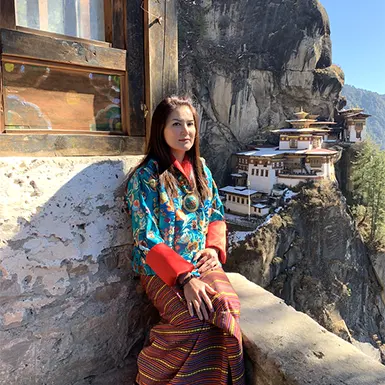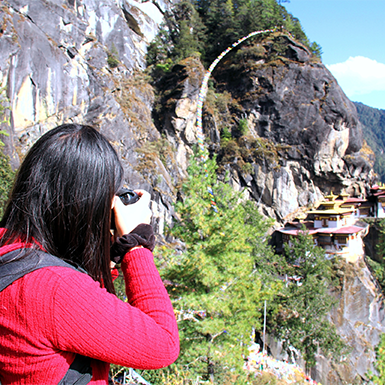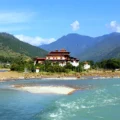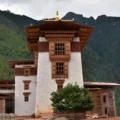The Kingdom of Bhutan Tourism, renowned as the “Land of the Thunder Dragon,” offers a harmonious blend of ancient traditions and awe-inspiring Himalayan landscapes. This nation boasts a rich history interwoven with Tibetan Buddhism, powerful dynasties, and a distinct cultural identity that has evolved over centuries. Bhutan’s dedication to preserving its heritage while embracing modern progress demonstrates its resilience and forward-thinking vision.
Bhutan’s historical tour began with the arrival of Tibetan Buddhism in the 7th century. Over time, influential figures and powerful families shaped Bhutanese history, culminating in the country’s unification under Zhabdrung Ngawang Namgyal in the 17th century. He established a dual system of governance that continues to influence Bhutan’s political landscape today. This system balances the roles of a spiritual leader (Je Khenpo) and a secular ruler (Druk Gyalpo), ensuring harmony between religious and worldly affairs.
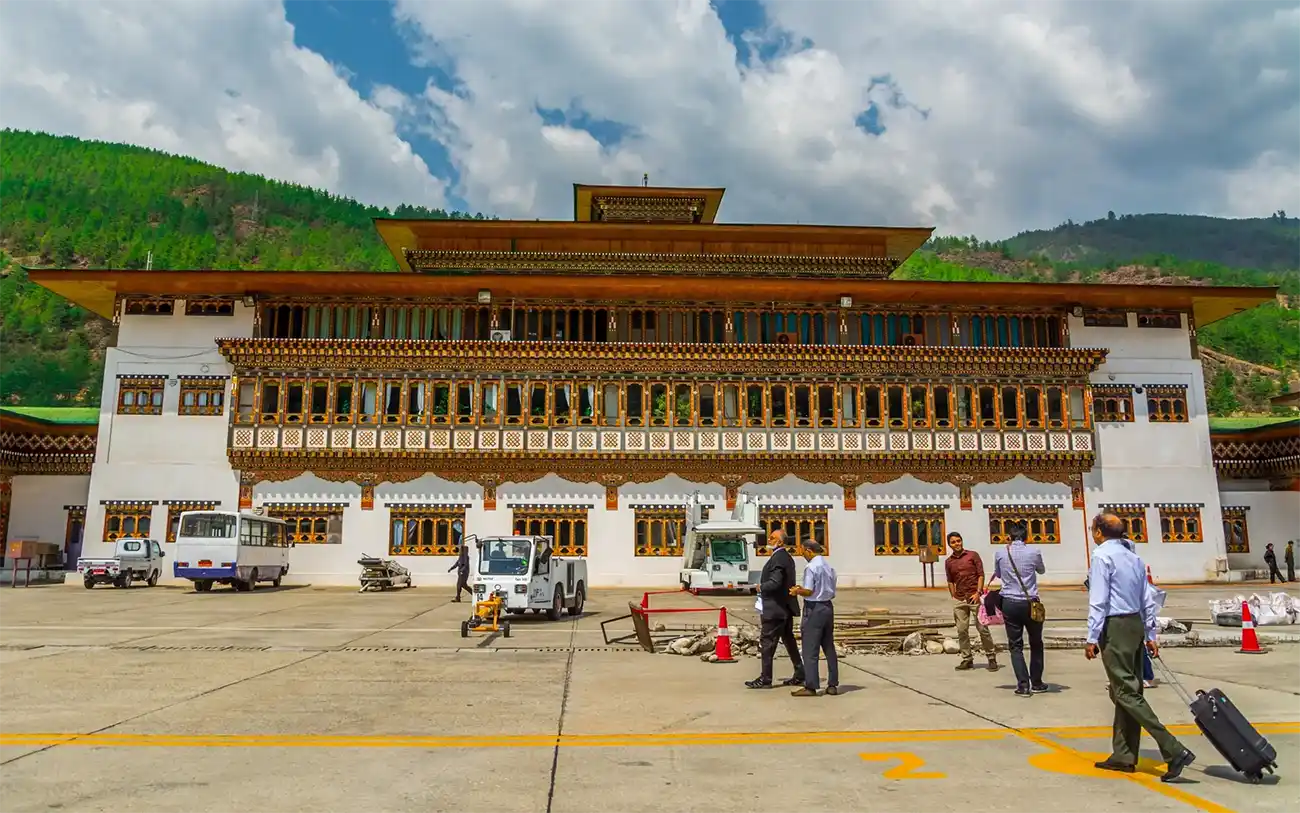
Bhutan’s Geographic Significance: Where Mountains Meet Magic
Bhutan’s strategic position in the Eastern Himalayas has profoundly influenced its destiny. Nestled between India and China, the Kingdom of Bhutan has historically served as a buffer zone, maintaining its independence and unique cultural identity.
- Mountainous Majesty: Towering peaks, including Gangkhar Puensum, the world’s highest unclimbed mountain, dominate Bhutan’s landscape. These majestic mountains create a dramatic backdrop for Bhutan’s pristine valleys, lush forests, and crystal-clear rivers.
- Biodiversity Hotspot: The varied altitudes and climates within the Kingdom of Bhutan support an astonishing array of flora and fauna. Home to the elusive snow leopard, the majestic takin, and a multitude of bird and butterfly species, Bhutan is a haven for endangered wildlife.
- Environmental Stewardship: Bhutan is a global leader in ecological conservation. Bhutan stands out as a global environmental leader, absorbing more carbon dioxide than it emits. Bhutan encapsulates its commitment to sustainable development in its Gross National Happiness (GNH) philosophy, which prioritizes the well-being of its citizens and the preservation of its natural heritage.
Bhutan’s Vibrant Cultural Heritage: A Tapestry of Tradition and Spirituality
The Kingdom of Bhutan Tourism, a Himalayan jewel, boasts a rich cultural heritage that intertwines spirituality, artistry, and festive celebrations. Delving into Bhutanese culture reveals a society that cherishes happiness, harmony, and reverence for nature.
Buddhism: The Cornerstone of Bhutanese Identity
Vajrayana Buddhism, the state religion, profoundly influences every facet of life in the Kingdom of Bhutan Tourism. It shapes the country’s values, customs, and artistic expressions. Monasteries, temples, and dzongs (fortresses) grace the landscape as hubs for spiritual practice and communal life. Prayer flags flutter in the breeze, spreading blessings across the valleys.
Daily Life Steeped in Spirituality
- Bhutanese people turn prayer wheels to gather merit and cleanse negative energy.
- Locals often offer butter lamps, incense, and flowers at altars and religious sites to express devotion.
- Tsechus are vibrant festivals that commemorate significant Buddhist events. These celebrations showcase masked dances, traditional music, and religious rituals, providing a unique insight into Bhutan’s cultural tapestry.
Traditional Arts and Crafts: A Testament to Bhutanese Creativity
Bhutanese art captivates with its intricate detail, vivid colors, and religious symbolism.
- Thangka paintings and religious scrolls portray Buddhist deities and narratives from sacred texts. These artworks often serve as tools for meditation and teaching.
- Artisans in Bhutan treasure their textiles for their distinct patterns, vibrant hues, and intricate weaving techniques. Traditional attire, like the gho (men’s robe) and kira (women’s dress), remain symbols of pride.
- Bhutanese architecture boasts a unique style, featuring towering dzongs, elaborate temples, and traditional wooden houses adorned with colorful paintings.
Festivals: A Cultural Kaleidoscope
Tsechus transcend religious observances; they are joyous communal gatherings that allow visitors to experience Bhutanese culture in its most dynamic form. Each region and valley hosts its distinct tsechu, often honoring a local deity or historical figure.
- The Paro Tsechu, held at the renowned Paro Dzong, is among the most popular in Bhutan. It features intricate masked dances, traditional music, and a grand display of thangkas.
- The Thimphu Tsechu, the capital city’s festival, draws crowds nationwide. It presents diverse cultural performances and provides opportunities for interaction with locals in a festive setting.

Unique Blend of Monarchy and Democracy
The Kingdom of Bhutan presents a unique political landscape harmonizing a long-standing monarchy with a gradual shift towards democracy. This blend reflects the nation’s rich cultural heritage and adaptation to modern governance.
Monarchy in the Kingdom of Bhutan: A Legacy of Leadership
Bhutan’s monarchy has deep historical roots, with the Wangchuck dynasty ascending to power in 1907. This monarchy has significantly influenced the country’s development, shaping its national identity and guiding its progress.
- Current Monarch: King Jigme Khesar Namgyel Wangchuck, who took the throne in 2006, is celebrated for his forward-thinking vision and dedication to the welfare of Bhutan’s citizens.
- Role in Governance: Although the king remains the head of state, his role has evolved with Bhutan’s democratic transition. He wields significant power over national security and foreign policy while serving as a unifying force and cultural icon.
Bhutan’s Journey Towards Democracy
The Kingdom of Bhutan’s shift to democracy is a significant chapter in its history, marked by adopting a new constitution and establishing a parliamentary system in the early 2000s.
- The Constitution of 2008: This pivotal document laid the foundation for Bhutan’s democratic framework, ensuring fundamental rights, creating a bicameral parliament, and defining the monarchy’s powers, government, and judiciary.
- The Political System: Bhutan’s governance combines a constitutional monarchy with a parliamentary democracy. The parliament includes the National Assembly (lower house) and the National Council (upper house), with the ruling party forming the government under the leadership of the Prime Minister.
Balancing Tradition and Progress
The Kingdom of Bhutan’s political structure exemplifies its ability to balance tradition and modernity. The monarchy embodies stability and cultural continuity, while the democratic system encourages citizen participation in governance. This combination allows Bhutan to address contemporary challenges while preserving its rich cultural heritage.
Key Takeaways
- Bhutan is a constitutional monarchy governed by a democratic parliamentary system.
- King Jigme Khesar Namgyel Wangchuck is the current monarch.
- The 2008 constitution was a crucial step in Bhutan’s democratic evolution.
- Bhutan’s political system carefully balances the roles of the monarch, government, and parliament.
Bhutan’s Unique Economy: Balancing Prosperity with Gross National Happiness
The Kingdom of Bhutan is a beacon for sustainable development, prioritizing Gross National Happiness (GNH) over traditional economic measures. Its unique approach has shaped a diverse economy that balances agriculture, tourism, and hydropower while prioritizing the well-being of its people.
Pillars of Bhutan’s Economy
1. Agriculture: The Foundation of Livelihoods
Agriculture remains the backbone of Bhutan’s economy, employing most of its population. The fertile valleys and terraced fields yield various crops, including rice, maize, wheat, potatoes, and fruits—Bhutan’s farmers also rear livestock like yaks, cows, and sheep. The government actively supports agricultural development through initiatives that promote organic farming, sustainable practices, and improved market access for farmers.
2. Kingdom of Bhutan Tourism: A High-Value, Low-Impact Approach
The Kingdom of Bhutan Tourism has carefully cultivated a “High Value, Low Impact” tourism policy. This unique approach limits the number of visitors and charges a daily tariff that covers accommodation, meals, transportation, and a licensed guide. This strategy preserves Bhutan’s pristine environment and cultural heritage while ensuring tourism benefits local communities. Bhutan attracts tourists with its stunning landscapes, ancient monasteries, vibrant festivals, and unique cultural experiences.
3. Hydropower: Harnessing Nature’s Energy
Bhutan’s abundant rivers and mountainous terrain provide a natural advantage for hydropower generation. The country has several large hydropower projects that generate clean energy for domestic consumption and export to neighboring countries. Hydropower is a crucial source of revenue for the Kingdom of Bhutan and contributes significantly to its economic development.
Gross National Happiness (GNH): A Paradigm Shift
Bhutan guides its development philosophy by the Gross National Happiness (GNH) principle, which assesses progress through economic indicators and environmental sustainability, cultural preservation, good governance, and psychological well-being. GNH has become a global inspiration, offering an alternative to traditional development models that prioritize economic growth above all else.
GNH in Action: Policy Impacts
- Environmental Protection: Bhutan has pledged to remain carbon neutral and has designated vast areas as protected parks and wildlife sanctuaries.
- Cultural Preservation: The government actively supports traditional arts, crafts, and festivals to ensure the continuity of Bhutanese culture.
- Social Welfare: Bhutan invests heavily in education, healthcare, and social services to improve the quality of life for its citizens.
- Sustainable Development: The Kingdom of Bhutan Tourism focuses on sustainable tourism, renewable energy sources, and organic farming practices to protect its environment and resources.
Bhutan’s Economy: A Model for the Future?
The Kingdom of Bhutan’s emphasis on Gross National Happiness challenges conventional notions of development. It demonstrates that economic progress can go hand-in-hand with environmental sustainability, cultural preservation, and the well-being of its people. Bhutan’s unique approach offers valuable lessons for other nations seeking a more holistic and balanced approach to development.
Bhutan’s Untamed Majesty: A Himalayan Haven for Nature Lovers
The Kingdom of Bhutan Tourism beckons nature enthusiasts and wildlife admirers alike with its awe-inspiring landscapes, rich ecosystems, and unwavering commitment to conservation. This Himalayan gem presents an unparalleled opportunity to explore the wonders of the natural world.
Bhutan’s Diverse Landscapes: A Tapestry of Contrasts
The Kingdom of Bhutan showcases a dramatic range of landscapes. Towering snow-capped peaks like Gangkhar Puensum, the world’s highest unclimbed mountain, pierce the sky. Lush valleys, bursting with vibrant wildflowers, descend into deep gorges carved by mighty rivers. Pristine alpine meadows offer sweeping vistas, while dense forests teem with abundant life. This varied topography creates a sanctuary for a stunning diversity of flora and fauna.
National Parks and Conservation: Protecting Bhutan’s Natural Heritage
The Kingdom of Bhutan leads the world in environmental conservation, safeguarding over 50% of its land through national parks, wildlife sanctuaries, and biological corridors. These protected areas preserve vital habitats for rare and endangered species, ensuring the long-term health of Bhutan’s ecosystems.
Notable National Parks
- Jigme Dorji National Park: Bhutan’s most giant national park shelters snow leopards, takins, blue sheep, and a wide variety of birdlife.
- Royal Manas National Park: This biodiversity hotspot is renowned for its elephants, tigers, golden langurs, and vibrant bird populations.
- Wangchuck Centennial Park: Established to honor the 100th anniversary of the Wangchuck dynasty, this park protects a vast expanse of untouched wilderness.
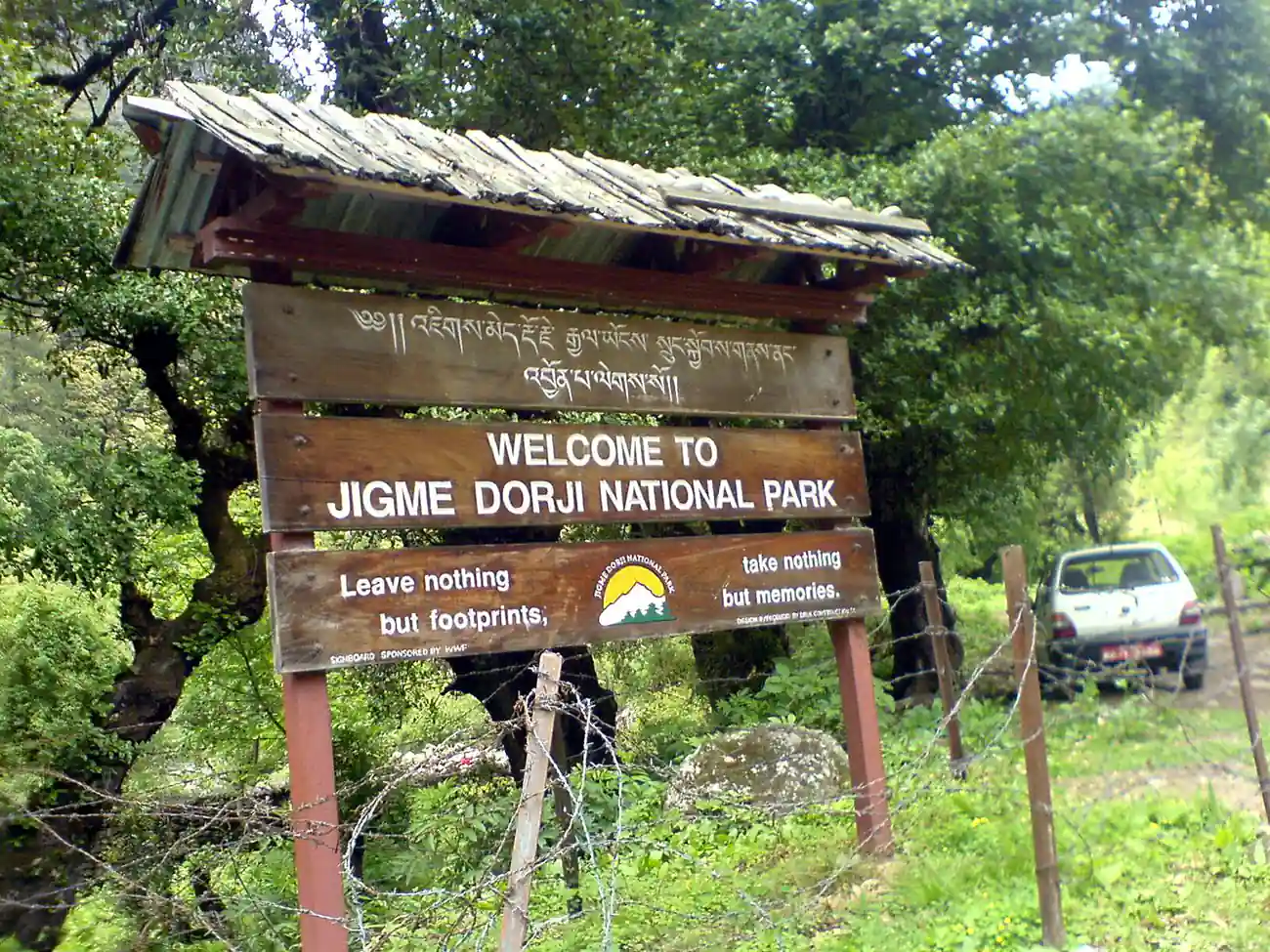
Bhutan’s Unique Flora and Fauna: Nature’s Masterpieces
The Kingdom of Bhutan’s geographical isolation and diverse altitudes foster an exceptional variety of plant and animal life.
Flora:
- Blue Poppy: Bhutan’s national flower, a rare and exquisite sight in high-altitude regions.
- Rhododendrons: The national forests ignite in a symphony of color during the spring rhododendron bloom.
- Medicinal Plants: The Kingdom of Bhutan boasts a rich tradition of utilizing plants for healing, with many species sustainably harvested for traditional medicine.
Fauna:
- Takin: Bhutan’s national animal, a unique bovine species found exclusively in the Eastern Himalayas.
- Snow Leopard: This elusive predator thrives in the Kingdom of Bhutan’s high-altitude landscapes.
- Bengal Tiger: Though rare, tigers continue to inhabit the dense forests of southern Bhutan.
- Black-Necked Crane: A majestic migratory bird that graces Bhutan’s Phobjikha Valley during winter.
Exploring Bhutan: A High-Value, Low-Impact Travel Experience
The Kingdom of Bhutan Tourism welcomes travelers with a unique approach to tourism, emphasizing quality over quantity. Their “High Value, Low Impact” philosophy aims to protect Bhutan’s pristine environment, vibrant culture, and authentic traditions while providing visitors with an enriching and meaningful adventure.
Bhutan’s Tourism Policy: Preserving Paradise
The Kingdom of Bhutan’s Tourism policy safeguards the nation’s natural and cultural heritage. Bhutan mandates a Sustainable Development Fee (SDF) for all visitors, which includes accommodations, meals, transportation, and a licensed guide. Travelers must book their trip through a registered tour operator. This fee supports Bhutan’s development projects and ensures tourism benefits local communities.
Key Attractions in Bhutan: Discover the Hidden Treasures
- Tiger’s Nest Monastery (Paro Taktsang): Hike to this iconic Taktsang Monastery perched on a cliffside. It rewards you with breathtaking views and a spiritual encounter, immersing you in Bhutan’s rich Buddhist heritage.
- Punakha Dzong: Marvel at this majestic fortress, a Bhutanese architectural masterpiece where two rivers meet. It once served as Bhutan’s capital and is of immense cultural and historical importance.
- Thimphu: Explore the capital city’s blend of modern amenities and traditional charm. Visit the National Memorial Chorten, Tashichho Dzong, and the Folk Heritage Museum to experience Bhutanese culture and history firsthand.
- Trekking in the Himalayas: Bhutan’s mountainous terrain offers world-class trekking experiences. Popular trails like the Snowman Trek, Druk Path Trek, and Jomolhari Trek showcase stunning mountain scenery and diverse flora and fauna.
- Festivals (Tsechus): Time your visit to coincide with one of Bhutan’s vibrant tsechus. These religious festivals allow you to witness traditional masked dances, music, and rituals.
Beyond the Ordinary: Unique Bhutanese Experiences
- Homestays: Experience the warmth of Bhutanese hospitality and engage deeply with the rich tapestry of local culture and lifestyle.
- Hot Stone Baths: Unwind and rejuvenate in a traditional hot stone bath, a therapeutic ritual utilizing water heated with river stones.
- Meditation and Yoga: Find tranquility amidst Bhutan’s serene atmosphere and spiritual traditions, perfect for meditation and yoga retreats.
- Textile Weaving and Handicrafts: Delve into Bhutan’s intricate weaving techniques and traditional crafts.
Responsible Travel: Your Role in Protecting Bhutan
The Kingdom of Bhutan’s “High Value, Low Impact” tourism policy encourages travelers to minimize their environmental and cultural impact.
- Pack Light: Bring only essentials to reduce waste.
- Respect Local Customs: Dress modestly, especially when visiting religious sites.
- Learn Basic Dzongkha Phrases: Locals appreciate visitors who try to speak their language.
- Support Local Businesses: Support the local economy by purchasing souvenirs from local artisans and dining at local restaurants.
Bhutan’s Balancing Act: Progress and Preservation in the Himalayas
The Kingdom of Bhutan, a nation steeped in tradition, actively confronts modern challenges like climate change, urbanization, and modernization. However, Bhutan’s unwavering commitment to sustainable development and environmental conservation sets a global example, offering valuable lessons to the world.
Facing the Future: Bhutan’s Challenges
- Climate Change’s Impact: Bhutan’s Himalayan location leaves it vulnerable to climate change. Melting glaciers, changing rainfall patterns, and increased natural disaster risks threaten agriculture, water resources, and infrastructure.
- Urbanization’s Growth: Bhutan’s growing population and urban migration pose challenges. Traffic congestion, waste management, and housing shortages demand innovative solutions. Balancing urban development with environmental protection remains crucial.
- Modernization’s Influence: While modernization brings economic growth and better infrastructure, it can erode traditional values and lifestyles. Preserving Bhutan’s unique cultural identity is a priority.
The Bhutanese Model: Sustainable Development for a Happy Nation
The Kingdom of Bhutan Tourism leads the world in sustainable development. The Gross National Happiness (GNH) guiding principle emphasizes well-being over material wealth. GNH influences every aspect of Bhutanese policy, from environmental protection to cultural preservation.
Environmental Conservation: A National Priority
Bhutan takes decisive action to protect its environment:
- Carbon Negative: Bhutan is the only carbon-negative country in the world. Its vast forests and reliance on hydroelectric power allow it to absorb more carbon dioxide than it emits.
- Protected Areas: Over half of Bhutan’s land remains protected within national parks, wildlife sanctuaries, and biological corridors.
- Waste Management: The government actively promotes waste reduction, recycling, and composting to minimize environmental impact.
- Sustainable Tourism: Bhutan’s “High Value, Low Impact” tourism policy limits visitor numbers and encourages responsible travel practices.
Bhutan’s Path Forward: Innovation and Tradition in Harmony
The Kingdom of Bhutan Tourism embraces the need for adaptation. It invests in education, healthcare, and renewable energy sources. The nation champions sustainable agriculture and eco-friendly practices, fostering entrepreneurship and innovation while upholding its cultural values. Bhutan’s Key Lessons:
- Bhutan demonstrates that a nation can address modern challenges while honoring tradition.
- The Kingdom of Bhutan’s dedication to Gross National Happiness guides its development strategy.
- Environmental conservation remains a top priority, as evidenced by its carbon-negative status and extensive protected areas.
- Bhutan balances economic benefits with environmental protection through sustainable tourism.
- The nation invests in innovation and adaptation to ensure a prosperous and sustainable future.

